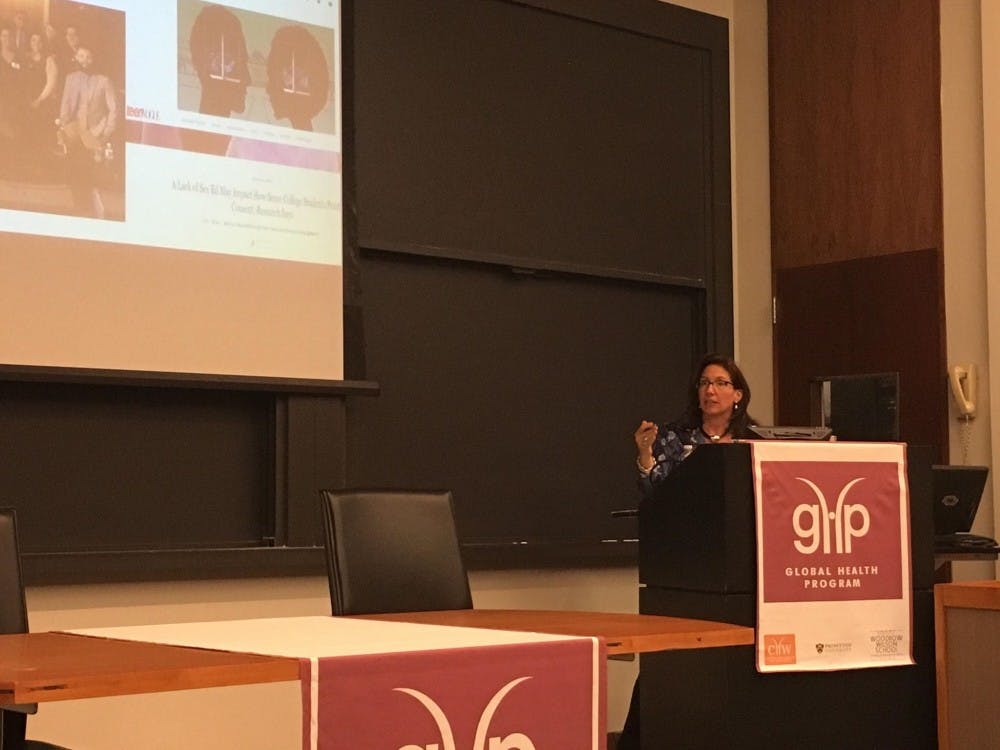“Drinking is a big part of heterosexual students’ strategies to accrue sexual experiences,“ said Dr. Jennifer Hirsch ’88, professor of sociomedical sciences at Columbia.
In a talk hosted by the Global Health Colloquium on Friday, Hirsch spoke about the sociological implications of college drinking culture on the pervasiveness of whiteness and toxic masculinity.
Hirsch is the co-director of the Columbia Population Research Center and the deputy chair of doctoral studies for the Department of Sociomedical Studies.
Her talk centered on her most recent research project, the Sexual Health Initiative to Foster Transformation (SHIFT). She worked with a sample size of 144 undergraduates at Columbia, conducting in-depth interviews.
The focus of Hirsch’s research was freshman fall, a time in a young adult’s life that she characterized as both “very exciting and socially painful.”
“Drinking plays an important role in settling in,” she said. “Alcohol acts as a social lubricant, helping to manage anxiety about making friends and creating shared experiences.”
According to Hirsch, drunken encounters between students often result in enduring and profound connections.
“Students form deep bonds or even find true love while holding back the hair of a vomiting friend or arguing over whether a friend needs an ambulance or just some water and a ride home.”

What Hirsch finds troubling, however, is the extent to which this drinking culture is riddled with toxic power structures.
“What a student perceives to be the general Columbia drinking culture is often only his experience as a wealthy white man,” she said.
Furthermore, Hirsch described alcohol as the primary catalyst for sexual experiences. To illustrate, Hirsch cited a few of her case studies. One female student, according to her, admitted, “I only have the courage to hook up [with men] when drunk.”
Another Columbia female student said, “It’s really challenging to meet men organically on this campus; the only flirtatious interactions I’ve had have been while intoxicated.”

During the Q&A, in response to a question about what makes this generation uniquely unable to mediate social interaction without alcohol, Hirsch insisted that “this generation” isn’t unique at all.
The problem, according to Hirsch, lies not with the students but with the adults’ exoticization of their behavior, which in reality is not so different from their own. Many adults regularly go to bars after work to meet people, for example.
Allocation of power in terms of controlling party spaces contributes another layer to the problem.
“An unintended consequence of the Minimum Legal Drinking Age is that freshmen have to venture into space controlled by upperclassmen, usually men,” said Hirsch, alluding to fraternity organizations.
“Two precious sources of social currency — alcohol and spaces to party without getting into trouble — are unequally distributed by age,” Hirsch continued.
Women’s drinking practices, Hirsch found, often have an “emulative quality.” Drinking contributes to building the image of a “chill, fratty, sexy girl,” an image that’s often crucial in women’s sense of belonging in friendship groups and on campus.
When asked to provide a specific measure a university could take to undermine this culture, Hirsch recommended providing spaces for underclass women to host parties, citing Rice University and Haverford College as institutions where similar measures have been taken.
Even among first-years, though, Hirsch found disparities of access.
“White wealthy students are the ones most likely to arrive to campus already in possession of fake IDs, and thus access to alcohol,” she said.
Further, she noted, Greek letter organizations tend to be associated with binge-drinking only when they are white men’s Greek letter organizations. Historically black colleges have lower rates of binge-drinking than white ones.
Hirsch concluded the lecture by reflecting on the breadth of reasons for undergraduate drinking: party drinking, sexual shame-related drinking, loneliness, and drinking to make friends, among others. University policy in addressing drinking ought to account for this variety, according to Hirsch.
The lunchtime lecture, entitled “The Toxic Campus Brew: Whiteness, Masculinity, Drinking Laws, Stress and Shame,” took place on Nov. 9 at 12 p.m. in Robertson 001.








